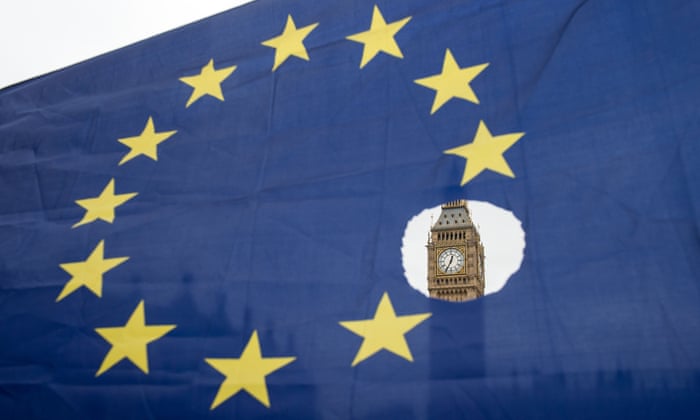EU states start to examine whether UK is likely to reverse Brexit
Ambassadors review likelihood of reversal despite many concluding no foreseeable scenario exists to allow for such a move

The UK might come to realise it made a mistake, German finance minister Wolfgang Schäuble suggested this week. Photograph: Oli Scarff/AFP/Getty Images
 Ambassadors from larger EU states have started to review whether the UK will reverse its Brexit decision in light of the election result, despite many concluding no foreseeable political scenario exists for abandoning it.
Ambassadors from larger EU states have started to review whether the UK will reverse its Brexit decision in light of the election result, despite many concluding no foreseeable political scenario exists for abandoning it.
Splits in Theresa May’s cabinet have emerged this week as senior figures set out alternative timetables for Brexit while the German finance minister, Wolfgang Schäuble, suggested the UK might realise at some point it “made a mistake”.
But the diplomats say senior UK civil servants have given no sign to them of an imminent change to May’s red lines on leaving the single market, the customs union and the jurisdiction of the European court of justice. They are expressing private impatience at the inability of the British government to set out a more detailed plan for Brexit more than a year after the referendum.
“It is is very inconvenient in my job that I cannot tell my capital what kind Brexit either of the main parties wishes to pursue. There is no clear information, just information on what politicians will not accept,” said one ambassador.
The chancellor, Philip Hammond, said this week in Berlin that the UK would not seek to remain members of the EU single market or the customs union but also called for early discussions on a lengthy transition period. He said the UK might want to negotiate a deal that was equivalent to being in the single market or the customs union without taking that legal form.
One ambassador at the heart of the talks said there was no guarantee the EU would even accept a transition, referring to a statement by the European council president, Donald Tusk, that there were only two options open to Britain: hard Brexit or continued EU membership.
The UK Treasury is desperate to reduce the levels of uncertainty about a future relationship, but this, EU diplomats say, is one of their strongest negotiating hands and talks on a possible transition may not begin until next year.
An EU-based diplomat said the onus remained on the UK to come up with a plan. He cited a recent speech by the former UK ambassador to the EU Lord Kerr, who said: “It is odd, if we want a deep and special relationship with the EU, not to have proposed one. A year after the referendum, we have still put forward no plan, suggestion, outline or proposal for how one might in future organise cooperation”.
The ambassadors do recognise, however, that softer Brexit solutions are likely to come back under discussion in coming months as the UK government’s apparent willingness before the general election to leave without a deal had faded. These options include membership of the European Economic Area, potentially on a temporary basis to maintain full single market access, joining the European Free Trade Association as a shortcut to replacing free trade deals negotiated by the EU and a customs union agreement with Brussels.
A third ambassador from a country close to the UK said he believed Whitehall departments were still coming to terms with the scale of the administrative tasks facing civil servants once outside the EU.
“The tragedy is that the issue that set all this off may be solved by the time the UK comes to Brexit,” he said. “There is a good chance the UK economy is heading for a quite nasty downturn due to its reliance on financial services, just as the EU is on an upturn, so the Poles that came to the UK will either stay at home or be going to elsewhere like Germany, and the numbers of migrants coming to the UK will be below 100,000.”
